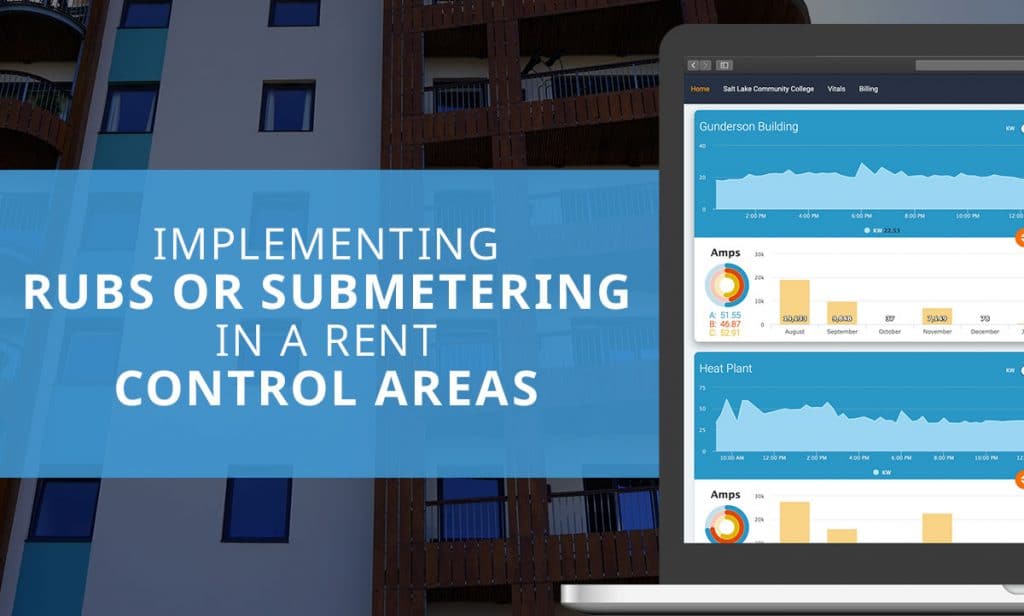RUBS, also known as a ratio utility billing system, and submetering are often vital tools for landlords. These systems can help landlords to split utility costs more easily and can allow tenants to have more control over their overall living expenses. They are also able to automate the utility billing process, which will save the landlord a significant amount of time. These systems encourage tenants to practice energy conservation, which is good for both the environment and your wallet. There are many benefits to using both submetering and ratio utility billing systems, but the ability to use them may fluctuate in rent control areas. It is important to know the laws regarding the use of these systems, because certain areas, like rent control areas, may prohibit their use. Different areas will also have different laws regarding the amount of notice you are required to give, among many other things.
Ratio Utility Billing System
A ratio utility billing system is a system that operates by dividing tenants’ utility expenses based on a variety of factors. These factors may include the number of tenants that are living in the unit, the size of the unit, and multiple other factors. A ratio utility billing system is a great way to fairly divide utility expenses without requiring the installation of specialized metering equipment.
Ratio utility billing can be customized to suit all of your needs. You may choose to use the number of tenants to allocate water expenses while simultaneously using the size of the building to allocate gas expenses. You can also use fractions of multiple factors to allocate the utility expenses, as well as using many other variations. Keep in mind that ratio utility billing may also be unfair in specific situations. A large family that takes measures to conserve water may actually end up paying a larger portion of the utility expenses than another family that wantonly wastes water.
Submetering
Submetering uses metering machines to measure the actual amounts of each utility that each tenant is using. This is the most fair and accurate way to allocate energy expenses because it only charges money depending on the actual utility use of the tenants. This method does require the installation of specialized metering equipment. Submetering is an excellent way to encourage tenants to reduce their energy consumption because they will be directly responsible for their own utility expenses. Submetering is a great way to allocate utility expenses for many reasons.
Our submetering systems won’t necessarily require new equipment. If you have previously installed metering equipment, we are capable to modify the existing equipment to fit with our processes. However, if you do need to install metering equipment, it is an investment that will quickly pay for itself. It can help minimize expenses and provide the most accurate way to allocate the overall utility expenses.
Ratio Utility Billing System vs Submetering
There are pros and cons to using either system for your utility bill allocation. Ratio utility billing doesn’t require any specialized metering equipment and is one of the most easily implemented systems. A ratio utility billing system, however, doesn’t monitor actual data use. Not only does this make it more difficult to effectively divide utility costs, but it also makes it more difficult to effectively manage overall energy consumption. It is vital to have actual data regarding energy use to manage it properly.
A submetering system does require the installation of specialized metering equipment. Submetering is likely the most fair way to allocate relevant utility costs, because it distributes these costs according to the actual consumption of energy. This also allows tenants to have the ability to lower their costs of living by practicing energy conservation measures and lowering their overall utility expenses.
There are many benefits to either system for utility bill allocation. Regardless of their pros and cons, both systems tend to be superior utility bill allocation methods to equally dividing the costs across all tenants. It doesn’t make sense for a tenant that lives alone to pay the same water bill as a family of 5 members. These systems can significantly help make utility bill allocation as fair as possible, which keeps everyone much happier.
Know the Laws
Though there are many benefits to both utility bill allocating systems, the laws pertaining to them will fluctuate based on the area. Rent control areas may impact the availability of these systems for utility bill allocation. Certain areas may prohibit implementing a ratio utility billing system but will allow a submetering system to be used. Other areas may prohibit the use of either utility bill allocation system, due to the rent control related laws. It is important to do all of the necessary research pertaining to the laws in your area before implementing these systems on your properties. Additionally, you will likely need to wait until you renegotiate contracts with tenants before subjecting them to these changes regarding their utility expenses. Nearly every situation will require a certain amount of notice prior to undergoing these changes. Luckily, here at Vitality Energy, we have the expertise and knowledge to provide you with the best utility bill allocation system. We are familiar with the laws in our area and are able to advise you regarding the ideal energy management or utility billing allocation systems for you and your unique situation.
Ratio utility billing systems and submetering systems provide many benefits to rental properties, tenants, and landlords alike. They allow landlords to minimize their own expenses. They also encourage tenants to practice energy conservation techniques and provide them with more control over their own living expenses. Both of these systems create situations where everyone wins, because they create a fair way to distribute utility expenses. Though these systems are very valuable, it is important to know the applicable laws when implementing one of these systems, especially if your property is located in a rent control area. To receive guidance regarding the best system to implement with your business, contact our experts at Vitality Energy today!





